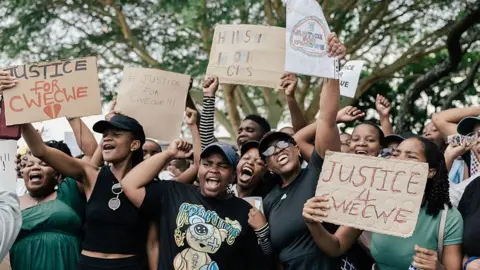Police seek to reassure South Africans over sexual abuse of seven-year-old girl
 AFP
AFPSouth Africa's Police Minister Senzo Mchunu has tried to reassure people that a "thorough investigation" is now "fully under way" into the alleged sexual abuse of a seven-year-old girl that has sparked nationwide protests.
Outraged citizens have been calling for justice for Cwecwe - the pseudonym given to the child to protect her identity.
The case was first reported to the police six months ago, but a lack of progress in the investigation prompted Cwecwe's frustrated mother to speak out on the matter.
South Africa has one of the highest rates of sexual violence in the world, with rape being the most reported crime against children.
Speaking at a briefing on Friday, Mchunu confirmed that the matter was first reported to police on 16 October last year.
A medical examination was then carried out, alongside an assessment by a social worker. But a month later prosecutors declined to take the matter forward "citing insufficient evidence as the reason" and based on what was in the police case file at the time.
Elaborating on the numerous challenges facing what he called a "complex case", Mchunu said it had been handled by three different investigating officers, which led to a file that "could have been better prepared". He also noted they had no witnesses to the alleged crime.
"One critical aspect which has continued to present a serious challenge is the matter around DNA. DNA testing was done on the victim as per procedure and the outcome was that no foreign DNA had been found," the minister told reporters.
He did however, confirm that three people of interest have been identified and "further DNA testing is under way".
The police stressed that none of these people were suspects at this point while they defended their handling of the case.
Mchunu confirmed that senior police officials had been assigned to the case.
"I can assure you that we are consulting with all relevant role players to ensure that every aspect of this matter is examined carefully and comprehensively," he said.
The police declined to provide more details of the progress of the investigation, citing its sensitive nature.
Details of Cwecwe's alleged sexual abuse first came to be widely known after her mother publicly shared details of the ordeal on numerous platforms.
In a wide-ranging interview last month with a local podcast, Hope Revolution, the mother of two said the alleged incident happened on 14 October, adding that it only came to the family's attention two days later.
She said that on 14 October, Cwecwe returned home later than usual and while there was no suspicion of anything amiss at that point, her unusual behaviour over the following days raised concern.
First her mother said she noticed Cwecwe's unzipped school trousers, then the repeated complaints of an upset stomach and finally her difficulty in walking.
Later, her mother recalled, the family noticed blood stains on the tracksuit trousers she wore on the day of the incident.
When the little girl's difficulty in walking persisted, her parents finally examined her, but "the idea of rape did not come to my mind", her mother said.
Cwecwe was then taken to the doctor for a formal examination and the mother recalled her reaction when she was told of the alleged assault.
"I cried because I am also a victim of rape so I know how it feels," she said.
According to the mother, little Cwecwe eventually opened up to her father on the events of the alleged incident.
She told him that while she and some schoolmates were waiting for the driver who transported them to and from school to arrive, the school's caretaker allegedly told them to go and sweep a classroom.
This rigorous activity soon wore her out, she further said, and she lost track of events from that point on - all she recalled was the caretaker announcing the driver's arrival.
Cwecwe would later tell her mother she remembered the smell of a "burning tyre" while she was in the classroom.
Cwecwe's mother was angry with the school's and police's alleged poor handling of the matter. This included threats of legal action by the school's principal in the aftermath.
AfriForum, an Afrikaner lobby group, has since announced it would be representing the school's principal after he was linked to the case despite not being identified as a suspect by police.
The right-wing group's private prosecution unit stepped in to assist the man after police asked for his DNA sample, which he refused to provide.
"I need answers, it cannot be that from October to [this] point, that no-one has been arrested, interrogated or had samples taken. What is going on?" Cwecwe's frustrated mother asked in the hour-long interview.
Shaheda Omar, director of the Teddy Bear Foundation - which provides support to child abuse victims - said that the "undue delays and responses [in this case] are totally unacceptable".
"The justice system is failing our children and we have to address these gaps and challenges in the structures that are failing our children," she said.
Dr Omar also weighed in on the school principal's refusal to provide a sample, saying that this was unacceptable and that the "right of a victim is to ensure that the case is explored to its fullest extent".
 Getty Images/BBC
Getty Images/BBCGo to BBCAfrica.com for more news from the African continent.
Follow us on Twitter @BBCAfrica, on Facebook at BBC Africa or on Instagram at bbcafrica
